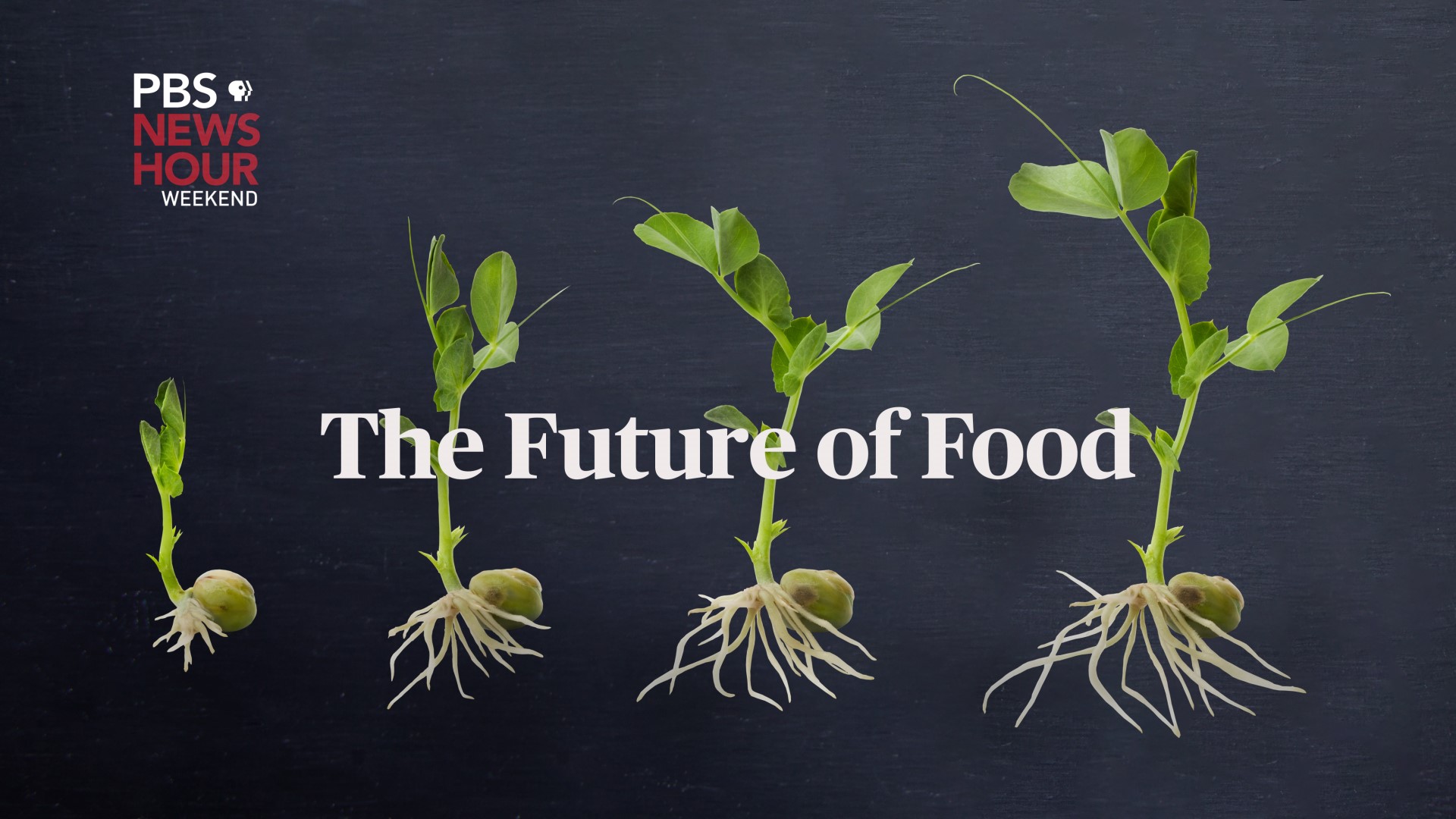
As concerns grow about the sustainability of meat production, some startup companies say they may have a solution: growing meat from animal cells in laboratories. NewsHour Weekend's Megan Thompson visited two startups in California producing "cell-based meat." This story is part of our "Future of Food" series, hosted by Mark Bittman and supported by the Pulitzer Center.
Mark Bittman:
With all of the concerns about the ethics, environmental impact and sustainability of meat production, many people are looking for alternatives. By now you've probably heard about the surge in popularity of burgers made solely from plants – even Burger King plans to serve one in all of its restaurants. But could it be possible to grow what amounts to real beef or chicken in labs, with no animals killed in the process? And could such a process actually be sustainable? It may sound like science fiction, but Megan Thompson traveled to California where a few companies are working to get lab-raised meat on your plate in the very near future.
Megan Thompson:
In 2005, Uma Valeti was an up-and-coming cardiologist in St. Paul, Minnesota. He'd just finished a prestigious fellowship at the Mayo Clinic and was treating patients with serious heart conditions, all while conducting cutting-edge research.
Uma Valeti:
In my practice in cardiology, I started working on a clinical study that took stem cells of patients that had large heart attacks or cardiac arrest. And we would take those cells and inject them into patients' hearts to regrow the heart muscle. That led me to start thinking can you just grow food from cells. And once the idea got into my head, it was really impossible to get it out.
Megan Thompson:
Valeti started researching the idea of creating meat in a lab. He'd always been bothered by the environmental impacts of meat production, and also the fact that billions of animals are slaughtered for meat each year.
Uma Valeti:
It really started dawning on me that all the pieces of what we needed to do existed in the world. And we had to put it together for this application of growing food.
Megan Thompson:
Valeti walked away from his promising cardiology career and moved his family to the San Francisco Bay Area to pursue the idea of creating what's known as "cell-based meat." In 2015, Valeti launched Memphis Meats, one of the first private companies in the world focused on the technology. The next year, Memphis Meats debuted its first product.
Video:
It tastes like a meatball.
Megan Thompson:
Valeti's lab-grown meatballs take only a few weeks to produce. A beef cow, by comparison, takes around 18 months to get to market. Valeti believes his fast-growing meat could help address the issue of increasing demand. With the middle class growing around the world, global demand for meat will double by 2050, according to the U.N.
Uma Valeti:
We're at a breaking point where I think if this demand for meat continues in the way it is, there just isn't enough resources for it. That's kind of why I think the crux of the whole thing requires massive innovation.
Megan Thompson:
Valeti also talks about one day creating healthier meats, less likely to cause the heart disease he saw in so many of his patients. Today, Memphis Meats has close to 40 employees and is working on duck and chicken, which Valeti gave me a sample of.
Megan Thompson:
Ok, here I go.
Uma Valeti:
Go for it.
Megan Thompson:
It's very tender. Yeah, there's definitely no way that I would, if you hadn't told me, that I would know this was grown in a lab and it didn't come from a conventionally raised chicken.
Megan Thompson:
It tasted good – and even had the fibers you'd expect – but the consistency was a little soft. Turns out, growing animal cells is one thing; but reproducing the structure of fats, collagen and blood vessels that give meat its texture is a big technological challenge. Scientists are still experimenting with "scaffolds," as they're called, to give the meat structure.
And, there's another challenge.
Megan Thompson:
When you say to somebody, here's a piece of meat that was grown completely in a lab, some people might say I'm not so sure about that. How do you get beyond that?
Uma Valeti:
I think we should be realistic and the industry should be realistic that we just can't expect everybody to say "yes, I'm behind it." It's going to take time.
Megan Thompson:
Despite the hurdles, Memphis has attracted more than 20 million of dollars of investment from big-name backers. Like Bill Gates, Richard Branson and the food giant Cargill. Tyson foods, one of the biggest meat producers in the world, has a minority stake in the company. Executive Vice President Amy Tu oversees Tyson's venture capital fund.
Amy Tu:
Our focus is on our traditional businesses, but we can't ignore the fact that the consumers are demanding different types of products. We want to be at the forefront of the future of food. So in order to do that, we may be looking at areas that may have been uncomfortable in the past.
Megan Thompson:
Memphis Meats is not the only company now trying to make cell-based meat a commercial reality. In just the last few years, several startups have launched in the U.S. and around the world. The interest is spurred, in part, by growing concerns about sustainability, as meat production requires more resources than other foods. About one-quarter of the world's ice-free land is used for livestock grazing; about a third of our cropland is used to grow livestock feed. And, according to the U.N., livestock production contributes almost 15% of the world's greenhouse gases. About the same as transportation.
Josh Tetrick:
More people will eat meat tomorrow than they are today. And it's a big issue.
Megan Thompson:
Josh Tetrick is the CEO of San Francisco-based food company Just, Inc. The company began launching vegan food products in 2013. Its novel items – like eggless eggs made from mung beans – are available across the U.S. Just, Inc., is now trying its hand at cell-based meat.
Megan Thompson:
If there are so many issues with eating meat, then why continue to promote it?
Josh Tetrick:
People like eating meat, you know. It's just the way it is. If we can figure out a way to allow them to eat all the meat they want, just a different kind of better meat without all the issues, I just think that's the most pragmatic way to fix the problem.
Vitor Santor:
So this is our early research lab for our cultured meat project.
Megan Thompson:
Biomedical engineer Vitor Santo is Just, Inc's director of what's known as cellular agriculture. He explained, the process starts with a small biopsy of an animal.
Vitor Santor:
It can be from a tiny piece of tissue, a small blood collection.
Megan Thompson:
And the animal then walks away.
Vitor Santor:
Exactly.
So in this container we have some of our chicken cells
Megan Thompson:
The chicken cells feed on a cocktail of proteins, sugars and vitamins. The process also requires a substance to spur cell growth, often made from the blood of fetal cows.
Obtaining this "fetal bovine serum" is a huge obstacle to scaling up production. It's usually used in medical research — and it's expensive and controversial. It comes from slaughtered pregnant cows – which means for now, some of the cell-based meats made by Just, Inc. and other companies aren't actually slaughter-free. Just, Inc. is working to create a new, plant-based alternative.
Vitor Santor:
We really want to get rid of it for ethical reasons and also because it's very expensive.
Megan Thompson:
Using the current process, it takes Santo about two weeks to produce this.
Vitor Santor:
So this is our ground chicken meat. Freshly harvested from the tank, the bioreactor where we are growing it.
Megan Thompson:
The meat is used in Just, Inc.'s crispy chicken nugget. Another challenge here is the price — this nugget cost about $100 to produce. But CEO Josh Tetrick says the price is falling quickly and that he'll be ready to launch his chicken nugget soon. The issue now is that it hasn't been approved by the government. The U.S. Food and Drug Administration and the Department of Agriculture have agreed to jointly oversee cell-based meats.
Sonny Purdue:
We want to be true world leaders on this topic, as we have challenges feeding the world.
Megan Thompson:
But the government has not yet decided how it will approve the products, inspect facilities, or what the rules will be for package labeling. And cell-based meat companies aren't the only ones concerned with that.
Kevin Kester:
We're not against technology whatsoever. We want them just to play by the same rules.
Megan Thompson:
Cattle rancher Kevin Kester says he wants to see the same government inspections of cell-based meat labs that traditional meat facilities get. And he wants it made clear on labels the meat came from a lab, not from a ranch.
Kevin Kester:
We want a level and fair playing field to where labeling claims and marketing claims are accurate and it doesn't confuse the consumers.
Megan Thompson:
Kester is a fifth-generation rancher raising more than 2,000 head of cattle on about 22,000 rolling acres in central California. Kester's also served as president of the National Cattlemen's Beef Association. He bristles at the environmental claims that supporters of cell-based meats make about the beef industry.
Megan Thompson:
A lot of people say it's really resource-intensive. It uses a lot of water and a lot of land. What do you say?
Kevin Kester:
A huge amount of that land is not viable for any other production.
Megan Thompson:
Like the land on his ranch, which is steep and rocky.
Kevin Kester:
So the highest and best use is for cattle.
Megan Thompson:
According to the USDA, American cattle production only contributes about 3% of U.S. Greenhouse gas emissions, and Kester says, the industry is improving sustainability and efficiency through better breeding and feeds.
Kevin Kester:
With less cattle, I can produce 33% additional pounds of beef because we've improved through technology and genetics what it takes to produce a pound of beef.
Megan Thompson:
Do you think that they'll ever be able to grow a hamburger like this in a lab?
Kevin Kester:
I think given enough time and research and development, yes. I do.
Megan Thompson:
And you're okay with that.
Kevin Kester:
Sure. It'll be a long time before the majority of at least the population of the U.S. would want to eat a lab-grown product.
Megan Thompson:
Even so, some experts say we need to start getting answers now to questions about the safety of these new products.
Barbara Kowalcyk:
This is a very disruptive technology, and what are the anticipated risks? We should be thinking about those now, rather than being reactive later on and trying to respond to them.
Megan Thompson:
Barbara Kowalcyk is a food safety expert at Ohio State University and sits on the FDA's science board. Kowalcyk's not opposed to cell-based meat, but says there are a lot of questions the government needs to get answered before it approves the meat for market. Kowalcyk says, we can't rule out the possibility of food-borne illness. And, she wonders about the long-term health effects of the substances used to make the meat.
Barbara Kowalcyk:
And those might be chronic health effects. So they might not emerge until someone has consumed it on a repeated basis, and so it may be years before we would actually be able to see a health impact.
Megan Thompson:
The problem, she says, is that the U.S. doesn't systematically track the health effects of new food products after they're introduced. She thinks cell-based meats should be regulated as biologic drugs. Their approval requires a lot more up-front and follow-up research about their safety.
Barbara Kowalcyk:
We haven't stepped back and said before we embrace this, let's look at the unintended consequences.
Megan Thompson:
Memphis Meats CEO Uma Valeti acknowledges the concerns – but points out conventional meat is one of the biggest sources of food-borne illness, and it's often contaminated during the slaughtering process.
Uma Valeti:
Because we're detaching slaughter from meat production, we are dramatically reducing the chances of contamination happening, therefore making food safer.
Megan Thompson:
In the meantime, Valeti's charging ahead with his bold vision.
Uma Valeti:
Ultimately this is coming. This is inevitable.
Megan Thompson:
He's hoping to get the green light from the government, soon.










